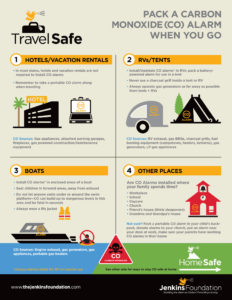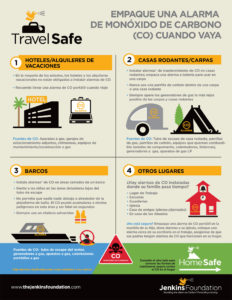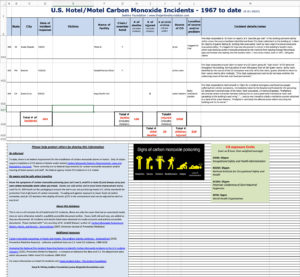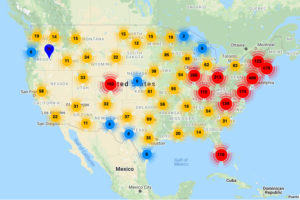Hotels/Vacation Rentals
Carbon monoxide (CO) alarms not only serve as lifesavers at home but can also make the difference between life and death when you check in to a hotel or vacation rental. Don’t forget to pack one when you leave on your next trip.
CO can invade lodging establishments and cause deaths and injuries in the same way it does in homes: via malfunctioning fuel burning appliances, inadequate maintenance of such appliances, blocked vents, misuse of gas powered tools, vehicles left running in attached garages, etc. In 2013, three people – Daryl and Shirley Jenkins and 11-year-old Jeffrey Williams – died in a North Carolina hotel room seven weeks apart due to CO leaking from a corroded pool heater exhaust system. The hotel had no CO detection installed. Without it, the staff had no way of being alerted to the life-threatening condition of their building, and guests had no way of knowing they were in danger.
CO poisoning incidents in hotels are far from rare and occur both in the U.S. and abroad. According to two published medical journal articles (see below), between 1989 and 2018 there were at least 183 documented cases of CO poisoning in U.S. hotels resulting in at least 49 deaths and more than 1600 poisoning injuries. CO poisoning can result in permanent brain damage and other physical injuries. It’s likely these numbers are much higher, as confirmed by a recent report that analyzed hotel CO incident response data from U.S. fire departments (see below). It’s impossible to have accurate totals because no federal agency tracks CO poisoning incidents in hotels, nor do they track incidents in vacation rentals.
Adding to the risk for travelers is the lack of universally required safeguards in the lodging industry. There currently are no federal requirements for the installation of CO detection/alarms in hotels or vacation rentals.
How can you protect yourself and your family from this silent killer when traveling?
- ALWAYS carry your own CO alarm (airlines allow them in both carry-on and checked bags – you may need to remove the batteries if you pack it in your checked bag) Report: Comparison of Four Low-Level CO Alarms Suitable for Home Use or When Traveling
- When reserving a hotel room or checking in, ask if they have CO detection installed – consider staying somewhere else if they don’t
- Ask similar questions when reserving a vacation rental. Airbnb and VRBO provide a search option to select rentals with CO alarms installed.
- When you arrive, be sure to check for CO alarms on the walls/ceilings. If you can’t tell what the devices are or if they are missing, contact the host or the front desk for clarification.
- Leave feedback to let hotels and hosts know how important CO alarms are to you. Until there is adequate legislation requiring these devices in hotels and vacation rentals, we all have the power of our voice and our choice to facilitate change in the travel industry.
For more CO safety travel tips, download our TravelSafe flyer:
Also available in Spanish:
The Jenkins Foundation tracks CO exposure incidents in U.S. hotels and maintains a database of cases dating back to 1967:
Download the Excel file here.
Download the pdf file here.
To view a mapped version of this data, visit REM Risk Consultants.
👉 Visit our Hotel Incident Data page for more information
“…(carbon monoxide) alarms have been readily available since 1989, but there is no uniform requirement for the lodging industry to install them.” Carbon Monoxide Poisoning at Motels, Hotels and Resorts, 2007
“As the traditional lodging industry (hotels, motels, and resorts) has not demonstrated inclination to install CO alarms in all guestrooms, government should mandate them as they do for smoke alarms.” Carbon Monoxide Poisonings in Hotels and Motels: The Problem Silently Continues, 2019
“…the public is being exposed to dangerous levels of CO during stays at lodging properties more frequently than previously realized.” Analyzing the national fire incident reporting system to identify carbon monoxide incidents in the U.S. lodging industry – ScienceDirect, 2021







 ...(carbon monoxide) alarms have been readily available since 1989, but there is no uniform requirement for the lodging industry to install them.
...(carbon monoxide) alarms have been readily available since 1989, but there is no uniform requirement for the lodging industry to install them.

